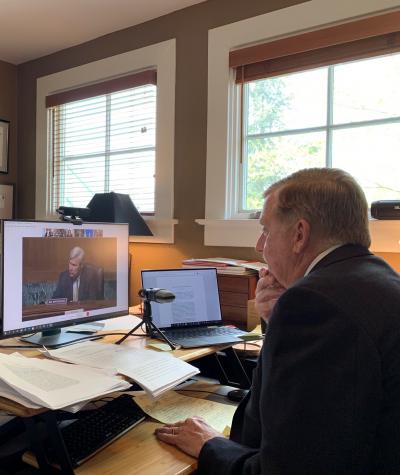Paul Smith, vice president, strategy and litigation at Campaign Legal Center (CLC) testified before the U.S. Senate Subcommittee on Federal Courts, Oversight, Agency Action and Federal Rights on April 27, 2021 about the ways the U.S. Supreme Court has gone astray in its decision making process in two important cases for our democracy.
Smith’s testimony specifically focused on errors in its judgment in the decisions in Citizens United v. Federal Election Commission (FEC) and Shelby County, AL v. Holder. In Citizens United, the Supreme Court ruled to strike down a prohibition on corporate independent expenditures in candidate elections, opening the door to unlimited spending by super political action committees (PACs) in our elections.
In Shelby County, the Court ruled to gut a key provision of the Voting Rights Act (VRA), which helped to reduce voting discrimination against communities of color. This provision, known as preclearance, mandated that states and localities with long histories of racial discrimination have their proposals for new voting rules be approved by the federal government before going into effect.
To shed light on the issues with the Supreme Court’s decisions in these two cases, Smith explained how fact-finding works in our country’s justice system. Our system gives elected officials the power to find facts and make laws. The role of courts is to resolve disputes between specific litigants by interpreting and applying the law.
In situations where courts do engage in fact-finding, appellate courts—like the Supreme Court—are supposed to defer to factual findings from trial courts. Trial courts hear testimony and witnesses directly, better positioning them to weigh and assess the evidence presented and the credibility of witnesses.
However, in Citizens United, the Supreme Court failed to base its rulings on thorough fact findings conducted by Congress and a trial court, the U.S. Court of Appeals for the District of Columbia Circuit. Similarly, in Shelby County, the Court disregarded the fact-finding done by Congress when issuing its ruling.
“In both Citizens United and Shelby County, the Supreme Court reached beyond its limits to opine on how elections work, basing those conclusions more on philosophical judgments than empirical reality.
And in both cases, the Court got it wrong––unchecked money in politics and the rise of voting discrimination have had profound distortive effects on our electoral system that hinder voters’ ability to prevent corruption and to hold elected officials accountable,” Smith stated in his testimony.
CLC has been fighting to make our government more transparent, accountable and accessible by working to help pass the For the People Act, H.R. 1/S. 1, which would decrease the influence of wealthy special interests and protect Americans’ freedom to vote, and the John Lewis Voting Rights Advancement Act, H.R. 4, which would restore federal preclearance protocols to block racial discrimination.
To make the promise of democracy real for us all, we need a government that is transparent, responsive and accountable to the American people.
